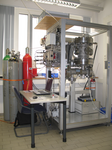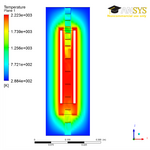High pressure TGA
Gasification-based combined power plants are characterized by their high levels of efficiency, the ability to capture CO2, and their high load cycling capabilities. Due to the rising number of fluctuating regenerative energy sources, these plants will be especially important in the future. Optimization of the power plant technology calls for an investigation of individual phenomena, such as the slagging tendencies or binding behavior of alkalis. The alkali behavior at the highest temperatures and in reducing (gasification) atmospheres is especially important when considering the purification of synthesized gas. The alkalis in the fuel result in hot gas corrosion, which majorly decreases the service life of the gas turbines. According to the current state of technology, the synthesized gas is cooled down before purification, so that the alkalis may condense. In order to reduce the loss of efficiency brought about by the latter step, purification of the synthesized gas at the highest possible temperature is the goal in the future. The most difficult and comprehensive part of the project is the planning and construction of the high pressure TGA. The largest difficulties arise due to the extremely high temperatures and simultaneously high levels of pressure, and the necessary highest level of precision in the exactitude of the TGA, down to the 1 millionth of a gram. After the completion and commissioning of the plant, the testing program on the behavior of alkalis at the highest temperatures and levels of pressure will begin at the Institute for Energy Systems. The investigation of the alkali behavior will at first be possible with a TGA. After this, the facility will be used for a wide spectrum of tests and question sets from both the energy technology and material scientific sectors.
Contact Person: Florian Kerscher


